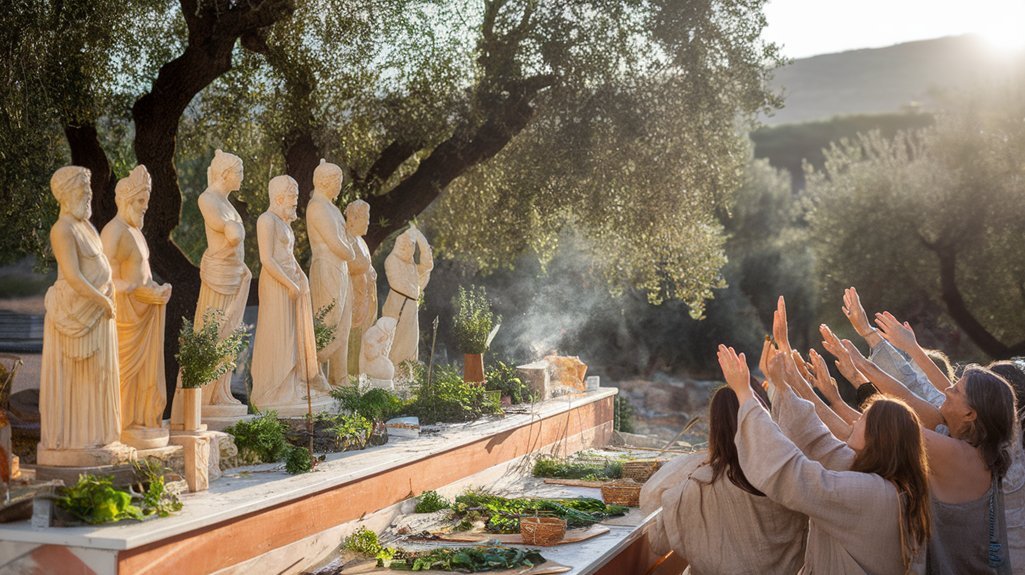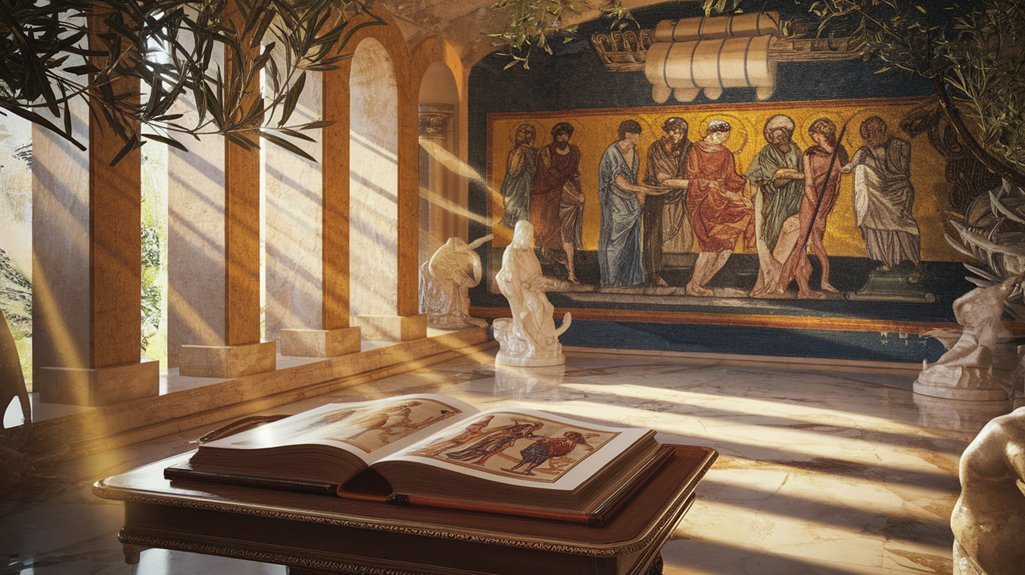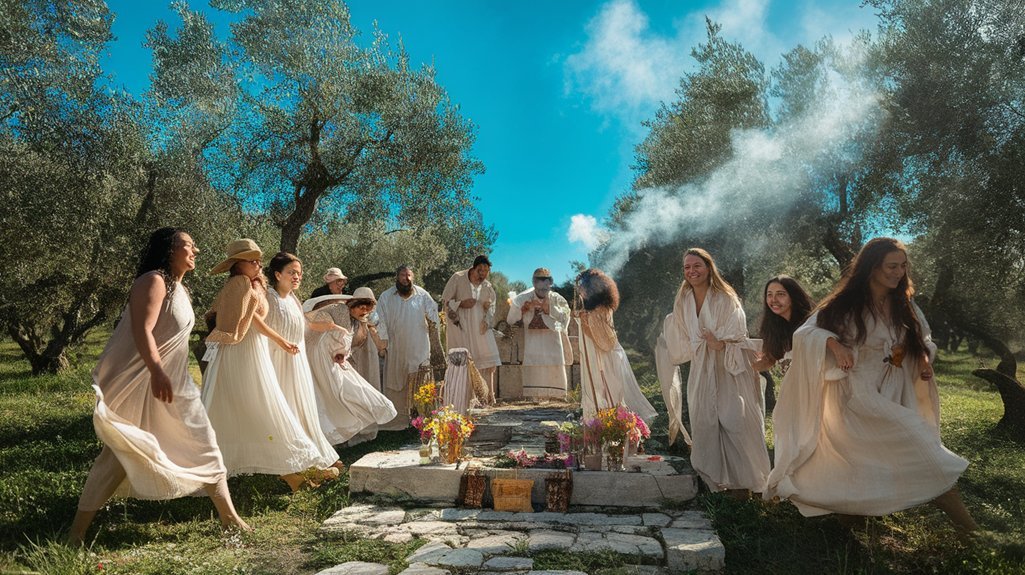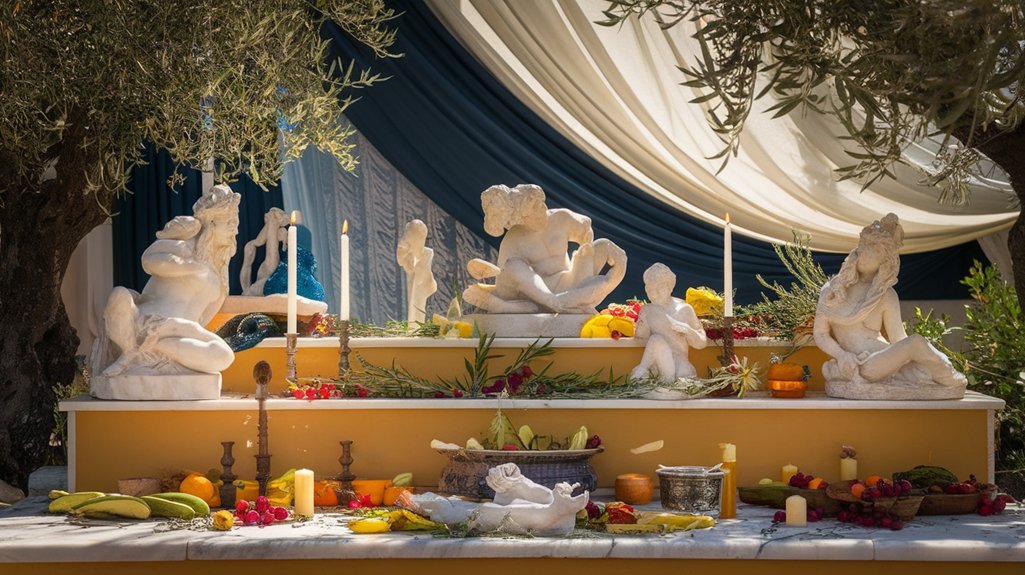As an Amazon Associate I earn from qualifying purchases.
Exploring the revival of Hellenic Polytheism invites you to reconsider ancient Greek spiritual practices through a modern lens. By understanding deities, rituals, and myths, you establish personal connections with the divine. This journey offers insights into ethical living and community dynamics, reflecting timeless values. As you navigate this rich tapestry of beliefs, you might find yourself uncovering unexpected relevance in today's world, sparking curiosity about how ancient traditions can inform contemporary life.
Key Takeaways
- Engage with ancient texts like Homer's epics and Plato's writings to deepen understanding of Hellenic beliefs.
- Build personal altars and sacred spaces to connect with the divine and honor ancestors.
- Participate in community gatherings and online forums to strengthen bonds and share knowledge.
- Integrate virtues such as wisdom and courage into daily life as a moral compass.
- Practice inclusive rituals that respect diverse identities and promote community ethics.
The Revival of Hellenic Polytheism in Modern Times

In recent years, the revival of Hellenic Polytheism has gained momentum, drawing interest from those seeking a spiritual connection with ancient Greek gods and practices. You might notice how ancient influences shape this cultural resurgence, intertwining historical accuracy with modern adaptations. Enthusiasts embark on personal journeys of spiritual exploration, navigating community challenges such as theological debates and varying interpretations of tradition.
Artistic expressions play a crucial role, offering fresh perspectives on rituals through innovations that respect ancient customs. This revival isn't just about mimicking the past; it involves reimagining practices to fit contemporary contexts. You'll find that maintaining historical accuracy often sparks debates, as practitioners strive to balance authenticity with relevance.
The community faces challenges in creating a cohesive identity, given diverse personal interpretations. However, these challenges also foster rich dialogue and collective growth, as each individual's journey contributes to the broader tapestry of modern Hellenic Polytheism.
Understanding the Pantheon: Key Deities and Their Roles
As the revival of Hellenic Polytheism unfolds, understanding the pantheon becomes vital for those engaging with this ancient tradition. The pantheon is a complex web of divine hierarchy, mythological narratives, and cultural significance. By exploring the roles of key deities, you'll grasp the essence of worship practices and ancient attributes. Consider these significant figures:
- Zeus – King of the gods, his rule embodies authority and order, illustrating themes of divine hierarchy.
- Athena – Goddess of wisdom and war, her stories reflect strategic thinking and cultural significance within ancient Athens.
- Apollo – God of prophecy and arts, his influence extends to creativity and healing, impacting worship practices.
These deities exhibit intricate relationships, shaping each other's mythological narratives and guiding societal values. By delving into their stories, you gain insight into the dynamic interactions and cultural roles that defined ancient Greek beliefs and continue to inspire modern practitioners.
Sacred Texts and Sources of Inspiration

Exploring the realm of sacred texts and sources of inspiration in Hellenic Polytheism reveals a rich tapestry of mythological and historical narratives. You'll find that sacred literature, such as Homer's epics, serves as both divine inspiration and historical text, offering a window into the beliefs and values of ancient Greece. Philosophical writings from thinkers like Plato and Aristotle provide further spiritual guidance, exploring the nature of the gods and the cosmos.
Ancient hymns and mythological narratives form the poetic traditions that continue to inspire modern practitioners. These texts are complemented by ritual manuals, which offer instructions for ceremonies, ensuring that you can engage with these ancient practices authentically. Cultural artifacts, like inscriptions and temple carvings, also contribute to understanding these traditions, revealing the complexities of Hellenic spirituality. Together, these sources not only inform but also enrich your connection to the divine, preserving the essence of this ancient faith.
Rituals and Offerings: Connecting With the Divine
Engaging in rituals and offerings is central to connecting with the divine in Hellenic Polytheism, as these practices serve as a bridge between mortal and godly realms. To foster a divine connection, consider the following elements:
- Sacred Spaces and Personal Altars: Designate areas in your home or garden. These spaces house ritual tools and represent a link to the gods. Personal altars adorned with offerings strengthen your devotion.
- Seasonal Offerings and Ancestor Veneration: Align offerings with the seasons, reflecting nature's cycles. Acknowledge ancestors through symbolic gestures, creating a continuum of reverence.
- Invocation Practices and Prayer Forms: Invoke deities through structured prayers and hymn singing. These practices, combined with symbolic gestures, enhance the sincerity of your requests.
Each ritual connects you to the divine, enriching your spiritual path within Hellenic Polytheism. By thoughtfully engaging in these practices, you honor the ancient traditions and cultivate a profound spiritual relationship.
Celebrating Festivals: Honoring the Ancient Calendar

Honoring the ancient Hellenic calendar through festivals offers a profound way to connect with the cycles of nature and the divine pantheon. You'll find festival significance lies in their role as seasonal rituals, marking changes in the natural world and aligning with the ancient calendar's structure. By participating in these festivals, you engage in a tradition that fosters community participation and reinforces cultural heritage.
Modern adaptations of these festivals allow for historical accuracy while integrating contemporary elements, ensuring relevance today. Celebratory practices, such as processions, offerings, and reenactments, are tailored to fit modern lifestyles yet retain their core spiritual essence. Understanding the festivals' context enhances your appreciation of their purpose and guides you in practicing them meaningfully.
Temples and Sacred Spaces: Where Worship Takes Place
In Hellenic polytheism, temples and sacred spaces serve as vital focal points for worship and spiritual connection. These sites are intricately designed, showcasing sacred architecture that reflects the divine interactions between deities and devotees. You'll find that temple symbolism is embedded in every column and frieze, pointing to their historical significance and cultural heritage.
Consider the sacred geography where these structures stand, often chosen for their natural beauty and alignment with celestial events. You might picture:
- Majestic columns rising against a backdrop of mountains.
- Inner sanctuaries that echo with silence, inviting introspection.
- Open courtyards bustling with community gatherings and seasonal observances.
These spaces aren't just relics of the past; they hold ritual importance today, serving as community spaces where worship practices are revived. A visit to these sites connects you to ancient traditions, offering a place for reflection and understanding of Hellenic roots.
The Intersection of Mythology and Modern Belief

While mythologies of ancient Greece might seem distant from today's world, they continue to weave through modern belief systems, influencing contemporary spirituality and cultural practices. You see mythological symbolism in modern rituals, where ancient archetypes find new life. Mythology education often highlights how narrative storytelling from the past informs today's spiritual pluralism. Through religious syncretism, these stories blend with other beliefs, creating a tapestry of faith.
| Concept | Modern Influence |
|---|---|
| Mythological Symbolism | Seen in art and modern rituals |
| Ancient Archetypes | Influence contemporary spirituality |
| Narrative Storytelling | Enhances mythology education and expressions |
Cultural appropriation sometimes clouds these influences, as artistic expressions misinterpret or oversimplify. However, understanding the context helps preserve authenticity. By acknowledging such intersections, you appreciate the complexity and richness of these narratives. This awareness fosters respect and genuine engagement with these timeless stories in a way that enriches modern beliefs and practices.
Community and Fellowship in Contemporary Practice
In contemporary Hellenic polytheism, building local worship groups can foster a sense of community and shared devotion, yet it's crucial to recognize the role of online platforms in connecting individuals across geographical boundaries. These digital spaces offer opportunities for inclusive ritual practices, accommodating diverse interpretations and expressions of faith. By balancing local engagement with online interactions, you can create a dynamic and supportive environment for practicing Hellenic polytheism today.
Building Local Worship Groups
Establishing a Hellenic polytheism worship group in your local area involves understanding both the historical underpinnings and the contemporary dynamics of community-building. Begin by organizing local gatherings to foster shared beliefs and establish a collective identity. Engage in group rituals within designated worship spaces to strengthen community bonds.
- Leadership roles: Define responsibilities to ensure effective management and direction.
- Member recruitment: Utilize community outreach to attract new participants who share your vision.
- Resource sharing: Collaborate on materials and knowledge to facilitate event planning and sustainable practices.
These elements create a resilient foundation for your group, encouraging participation and growth. Emphasizing inclusivity and open dialogue will further solidify connections within your burgeoning community, ensuring a vibrant, enduring practice.
Online Hellenic Communities
How can modern technology enhance the practice of Hellenic polytheism? By leveraging online forums, you can connect with like-minded individuals and share practices across the globe. Social media platforms facilitate digital rituals and virtual gatherings, allowing you to participate in community worship despite geographical boundaries. These platforms also serve as valuable community resources, offering a wealth of information and support. Online education provides you with in-depth knowledge of ancient traditions, making it accessible to newcomers and seasoned practitioners alike. Global connections foster a sense of belonging and strengthen your ties to the Hellenic polytheistic community. As technology continues to evolve, these digital spaces will play an increasingly vital role in sustaining and expanding contemporary Hellenic polytheistic practice.
Inclusive Ritual Practices
Modern technology not only connects individuals across the globe but also sets the stage for more inclusive ritual practices within the Hellenic polytheistic community. You can now partake in accessible practices that honor diverse beliefs. These contemporary interpretations foster communal participation through:
- Virtual Gatherings: Attend rituals online, making personal expressions more feasible and inclusive.
- Interfaith Dialogue: Engage with diverse faiths, embracing cross-cultural influences and local customs.
- Gender Inclusivity: Participate in rituals that respect and honor all identities, reflecting modern values.
These practices ensure your involvement in a tradition that values inclusivity and diversity. By engaging with others, you can strengthen community bonds and explore new interpretations. As a result, inclusive rituals evolve, integrating both ancient customs and contemporary insights, fostering a cohesive spiritual fellowship.
Ethical Living and Values in Hellenic Polytheism
In Hellenic Polytheism, you're encouraged to align your actions with virtues like wisdom, courage, and moderation, which serve as a moral compass. These principles aren't just personal—they extend to your role within the community, emphasizing social responsibility and collective well-being. By integrating these values into daily life, you contribute to both personal growth and the harmony of the community.
Virtues and Moral Codes
While exploring the ethical landscape of Hellenic Polytheism, you'll find that virtues and moral codes are deeply intertwined with its religious practices and beliefs. Ancient virtues, such as courage and wisdom, offer guidance for navigating ethical dilemmas and fostering character development. In this tradition, virtue ethics and moral philosophy are not separate from daily life but are integrated into societal values and personal integrity. Consider these key aspects:
- Community Ethics: Emphasize harmony and cooperation, reflecting moral teachings.
- Personal Integrity: Uphold honesty and accountability, crucial for ethical living.
- Moral Teachings: Draw from ancient narratives to inform modern applications.
Community and Social Responsibility
Although often overlooked, the concept of community and social responsibility is central to Hellenic Polytheism and its ethical framework. You're encouraged to engage in community outreach and social initiatives, fostering mutual support and collective responsibility. Ethical stewardship is reflected in communal rituals and local engagement, promoting shared resources and environmental stewardship. As a follower, you participate in charitable practices, enhancing the well-being of the community and ensuring that resources are used wisely and sustainably. The ancient Greeks understood the importance of these values, seeing them as integral to a harmonious society. By embracing these principles, you're not only honoring the gods but also contributing to a thriving, interconnected community that mirrors the virtues of ancient Hellenic life.
Integrating Ancient Traditions Into Daily Life

Embracing the rich tapestry of Hellenic polytheism in daily life can offer profound insights and a sense of continuity with the past. You can start by incorporating daily rituals and traditional practices that honor the gods and connect you with nature. Creating a home altar dedicated to personal devotion and ancestor veneration can serve as a focal point for meditation and reflection.
To integrate these traditions effectively:
- Seasonal Celebrations: Mark the changing seasons with festivals that bring awareness to nature's cycles.
- Artistic Expressions: Use art to depict myths and deities, fostering a deeper connection to the divine.
- Communal Meals: Share meals with family or community, reminiscent of ancient symposia, promoting unity.
Through these practices, you cultivate a meaningful connection to the ancient world, fostering an environment where contemporary life and historical spirituality coexist harmoniously. This approach not only enriches your spiritual journey but also strengthens your appreciation of cultural heritage.
Frequently Asked Questions
How Do I Explain Hellenic Polytheism to Someone Unfamiliar With It?
You can explain Hellenic polytheism by highlighting its roots in Greek mythology and the practice of Hellenic rituals. These rituals honor ancient gods, emphasizing a spiritual connection to Greek tradition, culture, and historical religious practices.
Are There Any Dietary Restrictions in Hellenic Polytheism?
When it comes to Hellenic polytheism, there's no strict dietary restriction. However, sacred offerings play a crucial role. You might find yourself participating in rituals involving specific dietary practices to honor deities, enhancing spiritual connections.
What Are Common Misconceptions About Hellenic Polytheism?
You might think Hellenic polytheism has rigid ritual practices or a strict divine hierarchy, but it doesn't. Misunderstandings often arise from oversimplifications; instead, it's a complex, flexible tradition valuing personal relationships with the gods.
How Does Hellenic Polytheism Address Modern Environmental Concerns?
Imagine the way ancient Greeks revered sacred nature as a living entity. You'll find that modern Hellenic polytheism promotes eco-spiritual practices, encouraging you to respect and protect the environment, aligning with contemporary environmental concerns objectively and contextually.
Can Hellenic Polytheism Coexist With Other Religious Beliefs?
You can see Hellenic polytheism coexist with other religious beliefs through interfaith dialogue and religious pluralism. It encourages understanding and respect, fostering an environment where diverse faiths engage harmoniously, acknowledging each other's values and practices.
Conclusion
As you journey through the vibrant tapestry of Hellenic polytheism, envision yourself weaving threads of ancient wisdom into the fabric of modern life. The olive branch symbolizes peace and community, while the laurel wreath embodies victory over disconnection. By honoring the gods with heartfelt rituals and embracing the myths' timeless lessons, you cultivate a garden of divine connection. Through shared celebrations and ethical living, you transform the echoes of ancient Greece into a harmonious symphony for today's world.
Amazon and the Amazon logo are trademarks of Amazon.com, Inc, or its affiliates.


